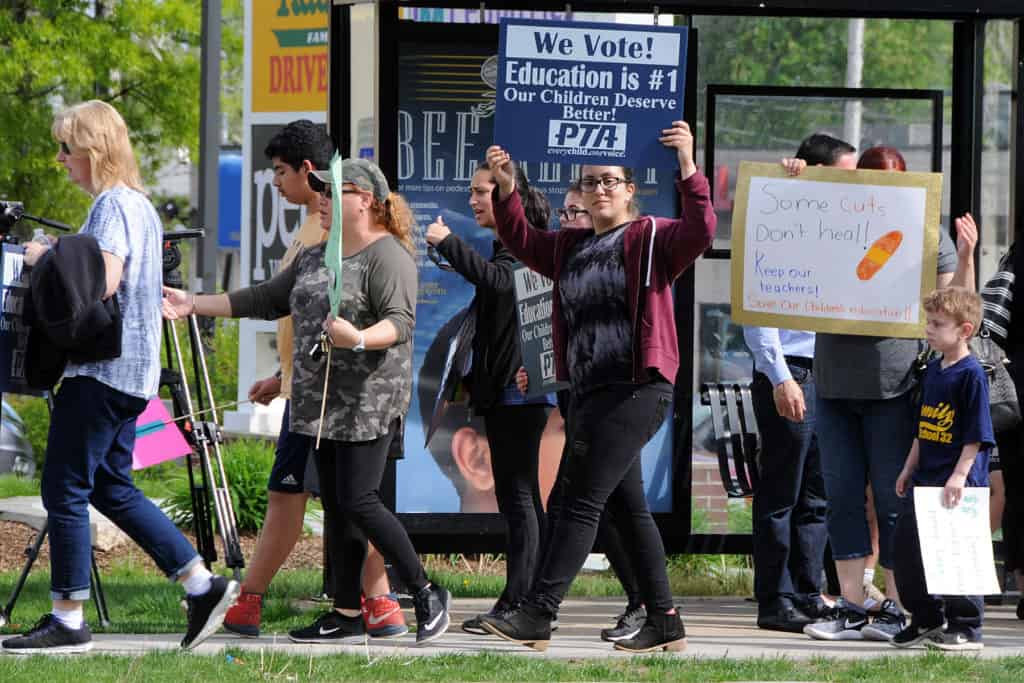
Hundreds of Layoffs Still at Risk
By Dan Murphy
Mayor Mike Spano and the Yonkers City Council continue to work through the difficult options and choices in the city’s fiscal 2019 budget, which starts July 1. Last week, the City Council passed a law permitting the city to pass a budget this year that exceeds the state-mandated property tax cap of 2 percent. The vote for this item gives the people of Yonkers insight into where the mayor and council might be headed to close a $23 million budget hole on the city side of the budget (including police, fire, DPW, and all other non-education departments).
The council has signaled its intention (with no other options) to vote for a budget that exceeds the cap. The question now becomes how high will the property tax increase be?
The mayor’s initial budget proposal from last month included a 2 percent property tax increase. A 4 percent property tax increase would generate an additional $8 million, a 6 percent property tax increase would generate an additional $14 million, and an 8 percent property tax increase would generate an additional $21 million.
With a budget hole of $23 million, any of these additional tax increase would help close the deficit, but would still not fill it. Only four votes on the City Council are required to pass a property tax increase above the cap, now that the law was passed to exceed the cap.
Council Democrats could pass a budget without the support of the three council Republicans, who might be more inclined to keep property tax increases to a minimum. But at this point it appears that all council members are starting to see this year’s budget as one where a tax increase above the cap is an inevitability.
The other possibility to help close the budget gap is implementing a garbage fee of $300 for every house, apartment, co-op and condo unit in the city. This tax would raise more than $20 million and would be evenly spread across the city. But the garbage fee idea has not been raised or discussed since it was tossed out last week. One reason may be that the revenue from a garbage fee cannot be used to close this year’s budget.
As one city official explained to Yonkers Rising: “Even though the city could collect the garbage fee revenues this fall, it would not count as revenue for this upcoming year’s budget, which has to be balance. That makes it unlikely, and only as a last resort.”
The last two options – union concessions and additional state aid from Albany – are also a real possibility, with the hopes that a combination of a property tax increase of 4 to 6 percent, union concessions and an Albany bailout, could close the budget hole and reduce the proposed 181 job eliminations on the city side of the budget.
Union leaders from the police (Yonkers Police Benevolent Association), fire (Local 628) and Department of Public Works (Teamster 456) all spoke out at a four-hour-long City Council budget hearing, with all demanding no cuts to their members and more funding for their departments to avoid layoffs.
Thirty days’ notice is required before city union employees can be laid off, which would require notification by the end of the month, if a budget were to be passed by the end of June. June 1 is the first deadline for a city budget to pass, but the real deadline, where tax bills have to go out, is July 1.
Last week, Yonkers Public Schools Superintendent Dr. Edwin Quezada increased the proposed number of layoffs for the school district from 221 to 251, to comply with the 30-day notice to union employees of layoffs. Quezada closed his proposed $551 million spending plan with a complete use of the fund balance and with the additional layoffs, most of which will come from Civil Service Employee Association members in YPS.
Quezada and the Board of Education had hoped for an additional $5 million from somewhere (the city or the state) to help save those last 30 positions, and in a recent conversation with Yonkers Rising, the superintendent remained hopeful that, by the end of next month, he will have funding to restore some of the 251 positions.
“I remain optimistic that the funding will come for my students to have the resources they need to learn and succeed, just like every other school district in Westchester, and in the state,” he said.
“Hopefully we can all come to an agreement at the end of the day,” added one City Hall insider. “Nobody will be happy, but that may be the way is has to be this year. A tax increase above the cap, union givebacks, and some extra funding from Albany… and even then we will still have some job losses.”





